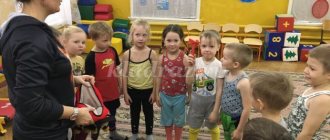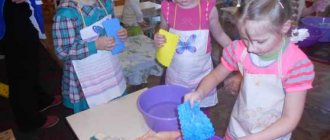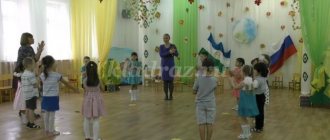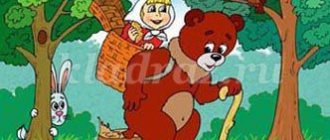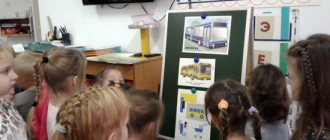Physical education as a basis for increasing the physical activity of children 6-7 years old in preschool educational institutions
Page 1 of 5
Physical education as a basis for increasing the physical activity of children 6-7 years old in a preschool educational institution
D.V. Khukhlaeva [14] characterizes physical education classes as the main form of systematic teaching of physical exercises to children. The special goal of the classes, in her opinion, is to teach children of all age groups correct motor skills and develop physical qualities.
D.V. Khukhlaeva emphasizes that “the importance of classes lies in the systematic implementation of interrelated health, educational and educational tasks, the implementation of which ensures physical development, strengthening the child’s health, acquiring the correct motor skills, nurturing an emotionally positive attitude towards physical education and sports, and the comprehensive development of his personality” [ 14 p.166].
T.I. Osokina [25] notes that mastering the educational material of the program in the classroom is the basis for all physical education and health activities and independent exercises and games for children.
E.Ya. Stepanenkova [37] believes that successful solution of educational problems is possible only if the requirements for the health-improving orientation of physical education classes are met. Ensuring high physical activity of children, observing scientifically based loads on all organs and systems of the child, according to the author, can ensure an effect in his physical development and health promotion.
Yu.Yu. Rautskis [39] emphasizes that the maximum effectiveness of physical education classes can be ensured if children’s activities are organized taking into account the principles of systematicity, accessibility, activity, consciousness, etc. It is extremely important, the teacher believes, that classes built according to a specific plan make it possible to regulate the impact physical activity for the child, gradually and carefully increase it, helping to increase the endurance of the child’s body.
Depending on the educational objectives and content, T.I. Osokina identifies different types of classes: 1) classes with a predominance of new material; 2) classes aimed at improving and repeating the material covered; 3) classes of a mixed nature; 4) classes of control, accounting type.
At the same time, she is about [25; p.29].
V.A. Shishkina, M.A. Runova and others believe that the main goal of classes is to satisfy the natural biological need of children for movement, to achieve a good level of health and comprehensive physical development; ensure mastery of motor skills, skills and basic knowledge of physical culture; create conditions for the comprehensive development of the child and instill in them the need for systematic physical exercise.
When analyzing the literature [35; 37; 44], we identified the following types of physical education classes:
- Forward
Plot - game classes in physical education plan-summary of physical education classes on the topic
MUNICIPALBUDGETARY
PRESCHOOL EDUCATIONAL INSTITUTION
"COMBINED KINDERGARTEN No. 1 "SIBIRIACHOK"
Game-based lesson in physical education
senior group
Physical education instructor, 1st qualification category: Bork Tatyana Viktorovna
2018
Tasks:
- Creating conditions for the development of the child’s emotional sphere.
- Develop speed, agility, initiative, endurance;
- Exercise children in different types of walking and running, throwing at a target, standing high jumps, climbing a gymnastic ladder;
- Cultivate perseverance, justice, honesty, and the ability to act in a team.
Equipment: 2 gymnastic benches, 2 paintings with the image of a shark, bags according to the number of children, 2 barriers, 2 tunnels, hoops 14 pcs., bananas made of fabric according to the number of children. 2 baskets, 100 plastic balls of two colors, guides for the snake 2 sets, massage mats (footprints, hedgehog).
Progress of the lesson
Children enter the hall, the teacher invites them to sit around him on the carpet and conducts an introductory meditation; the children close their eyes. At this time, the physical education instructor changes into “Robinson”.
Introductory meditation: (Sound of the sea music sounds) Invite children to imagine themselves on the seashore, the waves are rolling to your feet, you feel the pleasant freshness of sea water.
The mood becomes cheerful. Open your eyes.
Children open their eyes and “Robinson” stands in front of them.
Robinson:
Hello kids, boys and girls, tell us where you are from and where you are going.
Educator:
We are from the Polyanka kindergarten. We went to the island to find a treasure
Robinson:
To find the treasure you need to go around the island
Form a column one at a time.
Walking is normal, on toes, on heels, with long strides, running, Walking “Path” - children put their hands on the shoulders of the person in front, tilting their heads slightly down, walk one after another, run. Walking along massage paths.
Breathing exercise: “Steam whistle”
Noisily draw in air through your nose, hold your breath for 1-2 seconds, exhale noisily through your lips, folded into a tube, with the sound “oo-oo-oo” (the exhalation is lengthened)
Robinson:
You walked around the island boldly And now it’s another matter To gain strength You need to practice
Rebuilding in two columns
1. Relay race “Swimmers”
Children “swim” along the gymnastic bench (they move on their stomachs, pulling themselves up with their arms), take a bag from the basket, throw it at the image of a shark, and return in a straight line.
2. Relay race “Who is faster”
Children jump over barriers, crawl into tunnels, run through landmarks like a snake. Pass the baton to the next participant.
3. Relay race “The most dexterous”
Children walk along the bench with a bag on their head, climb onto the wall, pick a banana and climb down. Passing the baton to the next one
4. Classics relay
Children line up in two columns. Hoops are laid out in front of them in the form of hopscotch: one, two, one, two, one. At the teacher’s signal, the children jump through the hoops and run back, pass the baton to the next person on their team with a light slap on the hand and stand at the end of the column.
5. Relay race “Collect coconuts”
The balls are poured out of the basket onto the floor. Each column is shown what color balls they will collect (red, yellow, blue, white, etc.). At the signal, the children collect the balls.
Robinson: You turned out to be persistent, skillful and resilient. For a long time I have been waiting for such guys into whose hands I could give the treasure (hands over a chest with sports equipment (jump ropes, dumbbells).
Everyone is glad I put this in it. It carries a charge of health. So that you never get sick. So that your cheeks glow with a healthy blush. So that everything is in order. Always start your morning with exercises!
Robinson: Oh, I'm tired. I haven’t warmed up like this for a long time, let’s relax with you.
Relaxation: Lie on your back and close your eyes. Breathe lightly and slowly. Imagine that you are in a beautiful place (calm music sounds). Warm, quiet day. You are pleased and you feel good. You are absolutely calm, lie down and look up at the big, white, fluffy clouds. Clouds in a beautiful blue sky. As you inhale, you begin to gently rise above the ground. With each breath you slowly and smoothly rise towards a large fluffy cloud. Now you are floating on top of a big fluffy cloud. Your arms and legs are spread freely to the sides, you are too lazy to move. You are resting. The cloud slowly begins to fall lower and lower with you until it reaches the ground. Finally, you landed safely on the ground and your cloud returned to its home in the sky. It smiles at you, you smile at it. You are in a great mood, keep it for the whole day.
While the relaxation is taking place, the physical education instructor quickly changes clothes.
Guys, here we are again in kindergarten.
Bibliography:
- V.T. Kudryavtsev, B.B. Egorov “Developmental pedagogy of health improvement.”
- K.K. Utrobina "Entertaining physical education in kindergarten."
Thematic lesson in physical education “Journey to a fairy-tale planet” (preparatory group)
Tasks:
- Exercise children in various types of walking and running;
- To improve children's ability in long jumps and throwing at a horizontal target;
- Exercise balance: crawling on a gymnastic bench with support on your palms and feet;
- Develop dexterity in the game “Ribbon Traps”;
- Learn to relax and control your breathing.
Equipment: gymnastic bench, bags according to the number of children, throwing baskets; paper stream (width 100cm); ribbons according to the number of children.
Progress of the lesson
Invite children to imagine themselves in the forest with a short verbal story to revive the children’s imagination: “Once upon a time there was a green forest, it was not just a green forest, but a singing forest. The birches there sang the tender songs of the birches, the oaks sang the ancient songs of the oaks. The river sang, the fontanel sang, but of course the birds sang loudest of all.
The tits sang blue songs, and the robins sang crimson songs. But trouble happened in this forest. An evil wizard visited there and bewitched animals, birds, trees, flowers. They need your help.
Introductory meditation: (done with calm music)
In my chest, right here. Do you hear the clock ticking? Its sound is joyful and quiet. Only someone winds it.
Invite the children to find their heart, pressing both hands to their chest, and listen to how it knocks: “knock, knock, knock.” Then everyone should imagine that in their chest instead of a heart there is a piece of gentle sunshine. Its bright and warm light spreads over the body, arms, legs. There is so much of him that he will no longer interfere with us. The teacher invites the children to send a little light and warmth to this planet, and maybe it will come to life (put your hands forward vertically)
Form a column one at a time.
Walking is normal, back forward, rolling from heel to toe.
“Live Ribbon” walking with side steps: children holding hands walk in one direction or the other.
Running: with the shin swept back (arms forward, hand in fist), easy running.
Breathing exercises: “What does the forest smell like?” fresh air, flowers, grass. I.p. main stand. Inhale deeply through your nose and exhale through your mouth.
Formation in a column of four.
The teacher says that the forest began to come to life, as everyone gave it a little warmth.
General developmental exercises are performed
1. “Warm rain” (moistened the ground, refreshed the grass and leaves, let’s play with raindrops)
I.p. basic stance, hands behind your back.
1, 2 – bring forward, straight right (left) hand with palm up.
3, 4 – hide your right (left) hand behind your back (6-8 times).
2. “Colorful rainbow” (shone with different colors, decorated the planet)
I.p. feet shoulder-width apart, arms to the sides, palms up.
1 – tilt the torso to the right, raise the left hand upward across the side and lower the palm onto the palm of the right hand.
2 – i.p. the same to the left (6 times).
3. “Plants come to life” (trees, grass, flowers, reaching out to the sun)
I.p. legs together, arms along the body, head down.
1 – raise your arms straight up in front of you, put your right foot back on your toes, look up.
2 – i.p. Same with the left foot (8 times)
4. “Flight of birds” (beautiful fairy-tale birds, either fluttering their wings, rise high into the sky, or fly low above the ground).
I.p. basic stance, hands down. 1, 3 – arms to the sides; 2 – sit down. 4 – i.p. (7 times)
5. “Butterflies” (flutter around flowers, sit on them, drink nectar and fly again to another flower).
I.p. – sitting, knees bent and spread as far as possible, soles connected, hands folded, clasping the feet, heels pulled towards the body.
1-3 – legs bent at the knees make rhythmic movements, springy swaying (try to put your hips on the floor)
4 – i.p. (6 times).
6. “Bear” (she lost her mischievous cubs, looks for them and looks under the bushes).
I.p. – feet shoulder-width apart, arms to the sides.
1.3 – body tilts to the right, (to the left) hands behind the head:
2-4 – return to ip. (6-8 times).
7. “Lying on the grass” (let’s lie on the soft grass and look at the surrounding beauty).
I.p. – lying on your stomach, lean on your elbows, place your chin on the back of your hands.
1, 3 turn your head to the right (left) bend your right, (left) leg at the knees.
2, 4 – i.p. (6-8 times).
8. “Ant” (an ant has climbed onto your toes and is running along them: let’s look for the ant)
I.p. sitting, legs straight together, arms supported at the back.
1, 3 – forcefully pull the toe of your right (left) foot towards you.
2.4 – return to IP. (6 times).
9. “The squirrel cracked a nut”
I.p. - lying on your back, clasping your legs bent at the knees with your hands.
1 – put your feet on the floor, arms along your body.
2 – i.p. (7 times)
10. “The squirrel jumps from branch to branch”
I.p. – legs apart, arms forward in front of the chest, hands down.
1 – 4 jumps, moving both legs to the right – to the left. Alternate with walking in place (2 times)
Breathing exercises: “Let’s smell the flowers.”
Children perform a tilt, plucking as if a flower
Inhale through the nose, exhale through the mouth.
Well done guys, you brought the forest to life and it came to life. All the animals in the forest are happy.
Basic movements:
- Hares are frolicking - jumping across the stream. (4 times).
- Bears climb trees - crawling on a gymnastic bench with support on their palms and feet.
- “The squirrel throws cones” - throwing bags at a horizontal target.
Outdoor game: “Traps with a ribbon.”
Relaxation: “Lazy People Competition”
Today we saw many different animals in this clearing, but the lazy and lazy badger never appeared.
We will listen to a wonderful poem about him by V. Viktorov.
Even though it’s hot, Even though it’s scorching, All the people of the forest are busy. Only the badger is quite lazy. He sleeps sweetly in a cool hole. The couch potato has a dream. As if he’s busy with work. At dawn and at sunset. He still can’t get out of bed.
Children pretend to be a lazy badger. They lie down on the mat and while the music is playing, they try to relax as much as possible.
Low mobility game "Drozd"
Children are divided into pairs. The game is accompanied by text.
“I am a blackbird, you are a blackbird, I have a nose, you have a nose, (each first points to his own nose, then to the partner’s nose), I have smooth ones, you have smooth ones (points to cheeks), I have - sweet, you are sweet (points to lips), I am a friend, you are my friend. We love each other!"
Everyone hugs. Then the pairs change.
